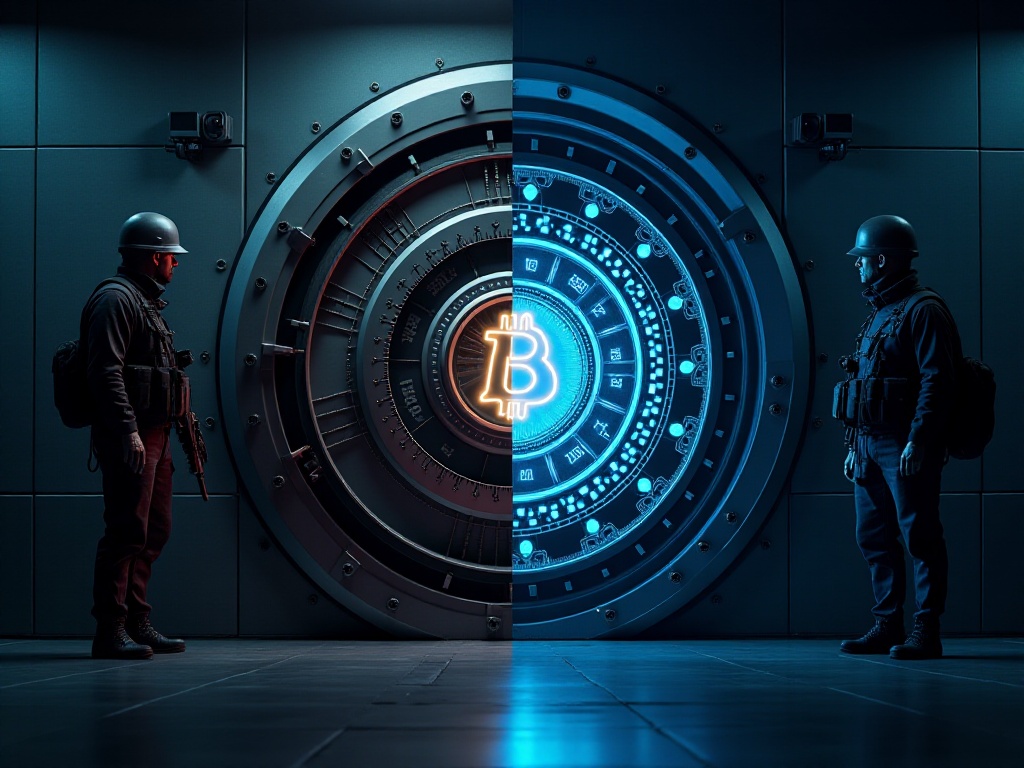

Introduction
Hello everyone! Today I'd like to discuss the crucial topic of cryptocurrency wallets. As someone who has been in crypto since 2017, I've experienced many ups and downs. Looking back at how clueless I was when I first started makes me laugh now. But it's precisely because I've made so many mistakes that I understand how important choosing a good wallet is.
To be honest, if someone had explained these things to me back then, I wouldn't have lost so much money. So today I'll share my accumulated experience from these years, hoping to help newcomers avoid the same pitfalls.
Basic Knowledge
Let's start with the most basic concepts. A cryptocurrency wallet is essentially a tool for managing digital assets, but it's much more complex than a traditional bank account. Think of a bank account as storing money in someone else's safe, where you need to go through the bank to access it. With a cryptocurrency wallet, you hold the safe's key yourself and can use it whenever you want, without depending on anyone else.
Here's a crucial point that's often overlooked: wallets don't actually "store" your coins. They store a special string of keys, specifically the private key. This private key is like your digital ID, proving that you own the assets at a particular blockchain address. This concept might sound abstract, but understanding it is crucial for using wallets safely.
Speaking of which, we must mention blockchain technology principles. Your cryptocurrency actually exists as data recorded on the blockchain, and your wallet is a tool that lets you view and manage this data. It's similar to how your bank card doesn't actually store money, but rather records your account information in the banking system.

Selection Guide
The market is now flooded with cryptocurrency wallets - searching "crypto wallet" in app stores yields hundreds of results. As a frequent early adopter, I've probably tried at least twenty or thirty different wallets. However, after years of use, I've found that choosing a wallet comes down to several core factors.
Security comes first, without question. Take the recently popular Plus Wallet for example - it has accumulated so many users in a short time largely because of its excellent security features. It not only employs high-strength multiple encryption technology but also supports biometric verification like fingerprint and facial recognition. Most importantly, users maintain complete control of their private keys, with the platform having no access - this is particularly reassuring.
Next is usability, especially important for beginners. Trust Wallet excels in this aspect, with an intuitive interface and logical feature layout. When I first got into cryptocurrency, I used Trust Wallet. Its mobile banking app-like operation logic makes it easy for complete crypto newcomers to get started.
Besides these points, wallet update frequency is also important. The cryptocurrency industry develops extremely rapidly - today's latest technology might be outdated tomorrow. A good wallet team must continuously update and optimize, not just release and forget.
Community activity is another factor. An excellent cryptocurrency wallet must have an active user community behind it. Through the community, you can stay updated on the latest developments and quickly get help when problems arise. I often hang out in various wallet telegram groups and find that Plus Wallet and Trust Wallet have particularly good community atmospheres, with users eager to help newcomers.

Practical Tips
After discussing selection criteria, let's talk about some practical tips for actual use. These are experiences I've gathered through years of trial and error, which I hope will help you avoid some pitfalls.
Backing up recovery phrases must be emphasized. This is like the key to your "digital inheritance" - once lost, it's truly irretrievable. I know a friend who lost over $500,000 in digital assets because his phone got water damaged and he hadn't backed up his recovery phrase. Honestly, I still feel pain thinking about it. I strongly recommend using multiple backups, perhaps splitting the recovery phrase into several parts and storing them in different secure locations. If possible, use fireproof and waterproof metal plates for storage - don't think it's too much trouble.
Multi-chain management is another topic worth studying. There are increasingly more blockchain projects now, with several mainstream public chains alone. If you needed a separate wallet for each chain, your phone memory would need to be enormous. That's why I mainly use multi-chain wallets like Plus Wallet, which supports multiple mainstream chains like ETH, BSC, TRON, etc., making it very convenient. Its cross-chain compatibility is also excellent, with smooth transfers between different chains.
Speaking of transfers, there are some tips here too. First, always make a habit of testing with small amounts, especially when using new wallets or transferring to new addresses. I usually test with a few dollars first, and only transfer larger amounts after confirming everything works. Also pay attention to gas fee settings - sometimes trying to save a few dollars in gas fees can leave your transaction stuck halfway, which isn't worth it.
For users who frequently interact with different DApps, the wallet's DApp browser functionality is also important. Plus Wallet does well in this aspect, with its built-in DApp browser supporting most mainstream protocols and loading quickly. However, always be careful about security when using DApps - it's best to only visit verified projects.

Advanced Operations
For those who have already mastered the basics, I want to share some more advanced usage tips. These might be a bit ahead of the curve for newcomers, but I believe you'll be able to use them soon as you gain experience.
Regarding asset allocation, I currently use a combination of cold and hot wallets. Large amounts are kept in hardware wallets for maximum security, as private keys never touch the internet. Small amounts for daily trading are kept in mobile wallets for convenience. Specifically, I keep over 80% of assets in cold wallets and the rest in hot wallets for daily operations. This configuration strikes a good balance between security and convenience.
Speaking of Swap functionality, I must mention Plus Wallet's recently launched "Swap to Earn" mechanism. This feature really impressed me - not only can you exchange tokens with low fees, but you can also earn additional rewards. Specifically, the system distributes platform tokens as rewards based on transaction volume for each swap operation. I earned nearly $200 last month through this feature, all while conducting normal transactions.
NFT management is another aspect worth attention. More and more wallets now support NFT functionality, but the experience varies significantly. Among the wallets I've used, Plus Wallet does well with NFT display and management, supporting preview of most mainstream NFT formats and allowing direct transfers and trading within the wallet.
For users frequently participating in DeFi projects, yield management is an important topic. Many wallets now integrate yield aggregators, allowing you to view and manage all DeFi project yields in one interface. This eliminates the need to check each project separately, which is very convenient. However, note that these features usually require authorization - pay special attention to security when using them.
Risk Prevention
In the cryptocurrency world, security always comes first. Over the years, I've seen too many cases of asset losses due to insufficient security awareness, so I particularly want to share some risk prevention experience.
First, be alert to phishing websites. Scammers are becoming increasingly professional, carefully creating phishing sites that look identical to official websites. Last year's security report showed that over 60% of users have encountered phishing sites. I strongly recommend bookmarking official websites you frequently use and not clicking links from social media randomly. Even links from search engines should be carefully verified, as many phishing sites buy advertising positions.
Authorization security is also a major issue. DeFi often requires smart contract authorizations, but many people don't carefully check authorization contents. It's like giving someone else your wallet key - very dangerous. I suggest carefully checking contract addresses before each authorization and regularly reviewing and clearing unnecessary authorizations. Plus Wallet does well in this aspect, providing authorization management features for convenient viewing and revoking of authorizations.
Password management is also important. Many people like using simple passwords or the same password across different platforms - these are particularly dangerous behaviors. I recommend using a password manager to generate random strong passwords and using different passwords for each platform.
Additionally, be especially careful when using public WiFi. It's best to use a VPN to encrypt network connections and prevent information interception. If you must operate your wallet in public places, it's recommended to use mobile data rather than public WiFi.

Future Outlook
Looking ahead to cryptocurrency wallet development in 2025, I think there will be many exciting innovations. First is the application of AI technology - future wallets might integrate smart investment advisor features to help users better manage assets. For example, they might automatically recommend optimal investment portfolios based on market data and user risk preferences.
Cross-chain technology will also see major breakthroughs. Although there are some cross-chain solutions now, they're not smooth enough to use. I believe that in the near future, asset transfers between different public chains will become as simple as transferring within the same chain.
User experience will also improve significantly. Many concepts are still too technical for ordinary users, like private keys and recovery phrases. Future wallets might use more intuitive ways to present these concepts, making them easy for ordinary users to understand and use.
However, regardless of how technology develops, security will always be most important. As users, we need to both keep up with new technology and maintain vigilance about asset security.
Based on these considerations, I suggest preparing 2-3 different backup wallets. This way, if one wallet has issues, others can still be used normally. Different wallets might also have different special features, which can be chosen based on specific needs.
Conclusion
The cryptocurrency world is constantly changing, with new developments every day. As participants in this field, we need to continuously learn and adapt. Although the process might be difficult, persistence will surely bring rewards.
I hope this article helps you better understand and use cryptocurrency wallets. If you encounter any problems during use, or have experiences to share, feel free to leave comments for discussion. Let's learn and progress together.
Do you find what I've shared useful? Welcome to share your thoughts and experiences in the comments. After all, in this rapidly developing field, everyone's experience is unique and valuable.






 Français
Français Deutsch
Deutsch Русский
Русский Português
Português Español
Español Italiano
Italiano Türk
Türk
